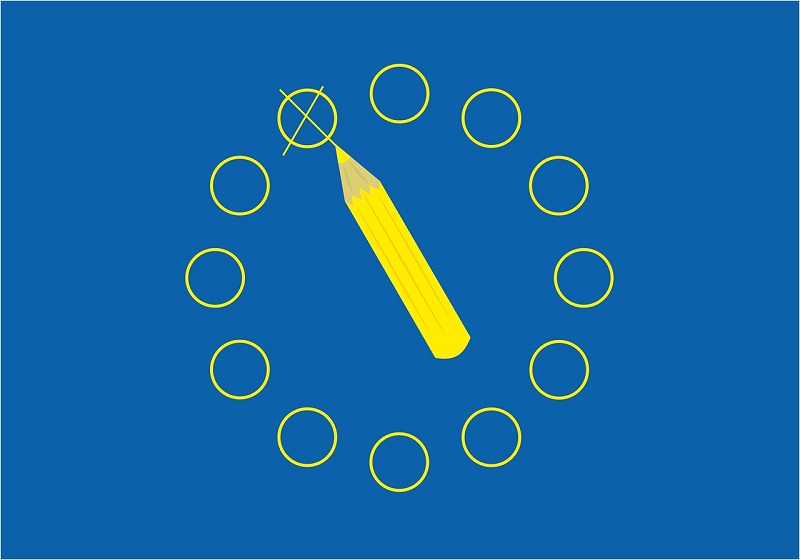Europe’s only decision
Posted By Carl Bildt on May 21, 2019 @ 11:00

As the European Parliament election approaches, Europe is abuzz with speculation over who will lead the main European Union institutions for the next five years. Among the positions up for grabs are those currently held by European Commission President Jean-Claude Juncker [1], European Council President Donald Tusk [2], EU High Representative for Foreign Affairs and Security Policy Federica Mogherini [3] and European Central Bank President Mario Draghi [4].
Personnel issues are hardly trivial. In politics, personality matters, and it has often played a pivotal role in determining the EU’s trajectory. Still, the leadership name game shouldn’t be the main focus. Far more important is the debate over the EU’s 2019–2024 strategic agenda.
After holding an informal summit [5] in Sibiu, Romania, earlier this month, European leaders will return to this issue in earnest later in June. And for all of the attention paid to the EU’s institutions, it is EU heads of state who will craft the bloc’s agenda. In other words, member-state governments, operating through the European Council, will be the actors to watch after the election results are in.
When the European Economic Community, the precursor to the EU, was established in 1957, its primary objective was to secure the peace between France and Germany, starting with a customs union for industrial goods (for the Germans) and a common agricultural policy (for the French).
This arrangement anchored the European agenda for decades. Then, when the Soviet Union and its empire collapsed, countries that had been trapped behind the Iron Curtain wanted to ‘return to Europe’. In the years since, the EU has undergone a massive expansion to include them. Its goal has been twofold: to aid the newer member states in their post-communist economic and political development, and to maintain continental peace and stability by bringing Central and Eastern Europe into the fold of EU institutions.
The immediate post–Cold War period was a time of self-confidence and optimism for the EU. Gradually, its strategic mission expanded beyond merely keeping the peace to projecting the European model of shared sovereignty and integration abroad. The EU model, it was said, would lead to more stable governance for the entire world.
Over the past decade, however, the EU’s effort to project its model outward has collapsed. Following the 2008 financial crash, the euro crisis and recurrent migration imbroglios, the EU has turned inward. At the same time, the EU’s immediate neighbourhood has transformed from a circle of potential friends and partners into a ring of fire.
Now, rather than trying to export stability, Europe’s strategic priority is to protect itself from the wider world. In trying to breathe new life into the EU after years of inward-looking crisis management, French President Emmanuel Macron has pushed for ‘a Europe that protects’. Following Macron’s call to arms [6] in March, the EU leadership in Brussels has taken up that mantra and bundled various initiatives under the theme of protecting Europe in an age of global tumult.
Such protection is undoubtedly necessary. Migration pressures, the constant threat of terrorism and escalating economic disputes all demand stronger policy responses. And while addressing some of these issues has proved controversial and difficult, the larger protection agenda is being carried out.
Yet, looking ahead, it’s clear that the current measures won’t be enough. The EU finds itself in a world dominated by great-power rivalries, Chinese assertiveness and revisionist Russian belligerence. Worse, in confronting these threats, it can no longer count on the US as an unconditional friend and ally.
The EU now must choose between securing its own place on the global stage and becoming a playground for other powers. This is a strategic decision of the first order—all other policy choices will follow from it.
If Europe ignores or checks out of the dramas roiling the world from Amritsar in India to Agadir in Morocco, it will fail to ensure peace in its neighbourhood and betray its promise to its citizens to protect them from external danger. For the EU to uphold its original mission—peace and stability at home—it must become a global player.
The choice, then, is clear. Europe’s strategic mission in the coming years must be to secure its position on the world stage, and all matters of policy and personnel should be settled in a way that advances that objective. Obviously, a strong European Council president, working closely with a strong high representative, will be essential. Both will need to mobilise the resources and talents of all member states to prevent the EU’s constituent parts from being pulled in different directions by global forces.
If the EU’s member states embrace this mission, Europe will be positioned to act as a global player for years to come. Otherwise, they—and the EU as a whole—will find themselves on a merry-go-round over which they have no control.
Article printed from The Strategist: https://www.aspistrategist.org.au
URL to article: https://www.aspistrategist.org.au/europes-only-decision/
URLs in this post:
[1] Jean-Claude Juncker: https://www.project-syndicate.org/columnist/jean-claude-juncker
[2] Donald Tusk: https://www.project-syndicate.org/columnist/donald-tusk
[3] Federica Mogherini: https://www.project-syndicate.org/columnist/federica-mogherini
[4] Mario Draghi: https://www.project-syndicate.org/columnist/mario-draghi
[5] informal summit: https://www.consilium.europa.eu/en/meetings/european-council/2019/05/09/
[6] call to arms: https://www.project-syndicate.org/commentary/three-goals-to-guide-european-union-renewal-by-emmanuel-macron-2019-03
Click here to print.